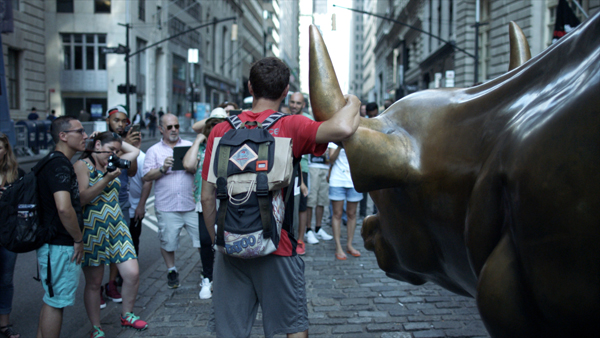The sincerest compliment I can pay The China Hustle is that it manages to be highly informative without ever becoming dry. Director Jed Rothstein accomplishes this feat by constantly focusing on the human side of each twist and turn related to a time during the mid- to late-2000s, when the American investment world was enthralled by the so-called “Chinese Miracle.” Thanks to reports of meteoric growth within China, and despite the unreliability of such data, brokerage houses and other financial players began selling the country as the next gold mine, though it was eventually apparent that not everything glittering was so valuable.
Rothstein’s documentary splices together interviews, ranging from ground-level traders to high-ranking executives of investment firms (including one former Democratic presidential nominee), to paint a multifaceted picture of how China infiltrated the American stock exchanges. It should not have been possible, due to rules barring Americans from directly putting money into any Chinese firms, but to paraphrase one interviewee, the financial system exists to reward those willing to flaunt its regulations. Exactly what happened involved transactions known as “reverse mergers,” which allowed Chinese companies to conceal their true values, or lack thereof, via firms that already had a presence on, say, the New York Stock Exchange.
Most interviewees claim they were oblivious to what was happening, but it’s easier to believe that the whole financial world was temporarily hypnotized by the razzle-dazzle. Indeed, there is footage from some of the legendary forums hosted by investment firm Roth Capital Partners, which helped bring many Chinese companies to market and subsequently sold billions of dollars of stock in them. Apparently, these were less business seminars than debauched spectacles full of sex, booze, and rock ‘n’ roll. It seems likely that many who should have taken a harder look at what they were selling suffered from moon dust in their eyes.
The filmmakers are only slightly more charitable toward regulators, such as the U.S. Securities and Exchange Commission, which they accuse of being, at best, over-matched. But make no mistake: The China Hustle wears its sense of outrage on its sleeve, though what is arguably most surprising is that some of most vehement anger comes from parties who actually benefited handsomely when China was a hot ticket. They include Dan David, who grew up in Flint, Michigan, and had been one of its biggest boosters until a damning report caused him to second-guess himself. The idea of corporate executives personally profiting by ripping off working-class folks like those he grew up with sticks in his craw, and spurs him to act.
David goes to great lengths to expose fraud, and in the process comes into contact with like-minded activists in the financial world, the most memorable being an American-Chinese analyst team working out of China. Back at the start of the film, David makes the claim that there are “no good guys” in this story, but it’s difficult not to view those attempting to wade through the lies as the heroes, given they were not only taking on American financial institutions but the nation of China. The risks faced by each of them go beyond becoming pariahs in their industry; many go to China and set up surveillance of companies there, which could lead to serious jail time if they are caught. Meanwhile, the aforementioned analyst duo come across as especially heroic, enduring constant harassment by police, who have been paid off by the companies that they previously exposed as misrepresenting themselves.
If David falls short of being the purest of white knights, it’s only because his final play may not be completely altruistic; that is, he likely profited from it personally. But it’s also a brilliant move, drawing on tactics considered to be from the darker side of the financial playbook, albeit used against an antagonist that is, in theory, even less ethical. I won’t give away exactly what he does, save to say it’s a silver lining to a story that’s otherwise a cautionary tale for investors to learn from.
Released by Magnolia Pictures
USA. 84 min. Rated R

















Leave A Comment